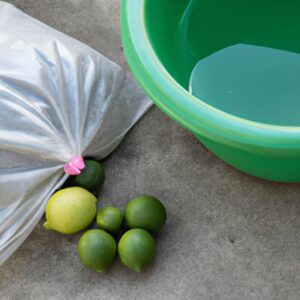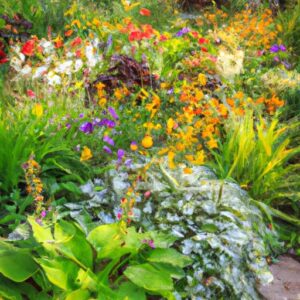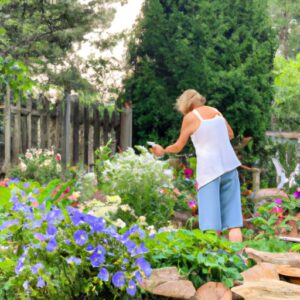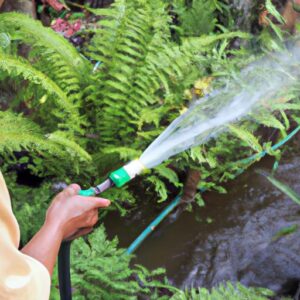As an expecting mother, you may find solace in spending time in the garden, surrounded by blooming flowers and lush greenery. Gardening not only offers a serene escape but also provides a plethora of physical and mental benefits during pregnancy. However, you might have come across concerns about gardening causing miscarriage, leaving you worried and uncertain. Let’s delve into this topic to shed light on the truth and alleviate any anxieties you may have.
The Importance of Gardening During Pregnancy
Gardening is not just a pastime; it is a therapeutic experience that can significantly enhance your overall well-being during pregnancy. The gentle exercise involved in tending to your plants promotes blood circulation, strengthens muscles, and improves flexibility. Engaging in such physical activity can be beneficial for your body, preparing you for childbirth and postpartum recovery.
Moreover, gardening is a natural stress-reliever. The soothing sounds of rustling leaves and chirping birds, the vibrant colors of blossoming flowers, and the earthy scent of the soil create a serene atmosphere that can help you relax and unwind. This connection with nature has been shown to reduce anxiety levels, alleviate depression symptoms, and enhance your mental health throughout the pregnancy journey.
Addressing Concerns: can gardening cause miscarriage?
Amidst the joy and anticipation of pregnancy, fears about potential risks can arise. However, rest assured that gardening is generally considered safe during pregnancy, and the idea that it can cause miscarriage is largely a misconception. Miscarriages usually occur due to genetic abnormalities or underlying health conditions, rather than activities like gardening.
While it’s essential to be cautious and prioritize your safety, there is no scientific evidence linking gardening directly to miscarriage. Nevertheless, it’s crucial to take certain precautions to minimize any potential risks and ensure a safe gardening experience for both you and your growing baby.
Purpose of This Article: Providing Information and Addressing the Topic
The purpose of this article is to offer you valuable insights and guidance regarding gardening during pregnancy. We aim to provide accurate information, debunk myths, and alleviate any concerns you may have. By understanding the benefits of gardening, addressing potential risks, and following necessary precautions, you can enjoy the therapeutic wonders of gardening while nurturing your pregnancy.
So, let’s delve deeper into the world of gardening during pregnancy and explore the potential risks, precautions, and scientific evidence to ensure you have all the information you need to make informed decisions. Remember, your well-being and the well-being of your baby are of utmost importance, and we’re here to support you throughout this beautiful journey. Stay tuned for the subsequent sections where we’ll provide you with comprehensive insights and expert advice.
Understanding Miscarriage
When discussing the topic of gardening and its potential impact on pregnancy, it’s crucial to have a comprehensive understanding of miscarriage. Miscarriage, also known as pregnancy loss, refers to the spontaneous termination of a pregnancy before the 20th week. It is a heartbreaking experience that affects many women, and it’s important to recognize that it is not typically caused by everyday activities such as gardening.
Definition of Miscarriage
A miscarriage occurs when the embryo or fetus cannot survive in the womb, leading to its expulsion. This can happen due to various reasons, including genetic abnormalities, chromosomal disorders, or medical complications. It is a natural process that the body undergoes when the pregnancy is not viable, often accompanied by symptoms such as vaginal bleeding, cramping, and the passing of tissue.
Common Causes of Miscarriage
The most common cause of miscarriage is chromosomal abnormalities in the fetus, which occur spontaneously during the formation of the embryo. These abnormalities prevent the baby from developing normally, leading to a miscarriage. Other causes may include maternal health conditions such as hormonal imbalances, uterine abnormalities, or chronic illnesses like diabetes or thyroid disorders.
Factors that May Increase the Risk of Miscarriage
While gardening itself is not a known risk factor for miscarriage, certain factors may increase the likelihood of experiencing a pregnancy loss. These factors include advanced maternal age (over 35), a history of previous miscarriages, certain medical conditions, smoking, drug or alcohol abuse, and exposure to environmental toxins.
It’s important to note that the occurrence of a miscarriage does not imply that any particular activity, including gardening, directly caused it. Rather, miscarriages are typically a result of underlying genetic or medical factors. With a better understanding of miscarriage, we can now explore the benefits of gardening during pregnancy and the precautions necessary to ensure a safe and enjoyable experience.
Gardening and Pregnancy
Pregnancy is a transformative journey, and engaging in gardening can be a wonderful way to nurture yourself and your growing baby. Let’s explore the numerous benefits of gardening during pregnancy, both for your physical and mental well-being. Additionally, we’ll provide you with essential precautions to ensure a safe and enjoyable gardening experience.
Benefits of Gardening During Pregnancy
-
Physical Well-being: Gardening involves gentle physical activity that can help you maintain a healthy pregnancy. The moderate exercise of planting, weeding, and watering can improve cardiovascular health, strengthen muscles, and enhance flexibility. These activities also promote better blood circulation, reducing the risk of conditions like swollen ankles and varicose veins.
-
Stress Reduction: Pregnancy can bring about various stressors, but gardening acts as a natural stress-reliever. Spending time outdoors surrounded by nature’s beauty can elevate your mood and decrease stress levels. The fresh air, soothing sounds, and vibrant colors can create a calming environment, allowing you to unwind and find tranquility amidst the chaos.
-
Connection with Nature: Gardening provides an opportunity to connect with nature, which can be immensely beneficial during pregnancy. Being in touch with the earth, feeling the soil between your fingers, and witnessing the growth of plants can instill a sense of grounding and gratitude. This connection can foster a deeper bond with your body and the life growing within you.
Precautions to Take While Gardening During Pregnancy
While gardening is generally safe during pregnancy, it’s essential to prioritize your well-being and take certain precautions. Here are some guidelines to ensure a safe and enjoyable gardening experience:
-
Avoid Exposure to Harmful Substances: Minimize contact with potentially harmful substances like pesticides, fertilizers, and toxic plants. Opt for organic gardening methods and natural alternatives whenever possible. Wear gloves, protective clothing, and a mask if necessary.
-
Take Breaks and Stay Hydrated: Gardening can be physically demanding, so remember to take regular breaks to rest and hydrate. Overexertion and dehydration can pose risks, so listen to your body’s cues and give yourself time to replenish.
-
Lift and Bend Carefully: If you need to lift heavy objects or bend down, do so with caution. Engage your leg muscles and use proper lifting techniques to avoid straining your back or abdominal muscles. Consider using lightweight tools or seeking assistance for heavier tasks.
By embracing the benefits of gardening and following these precautions, you can fully enjoy the therapeutic experience while safeguarding your well-being and that of your baby. In the next section, we’ll address potential risks associated with gardening during pregnancy and provide further guidance to ensure a safe gardening journey.
Potential Risks and Precautions
Gardening can be a delightful and fulfilling activity, but it’s important to be aware of potential risks and take necessary precautions to ensure a safe experience during pregnancy. Let’s explore some of the risks associated with gardening and discover practical tips to minimize them.
Understanding Potential Risks Associated with Gardening
While gardening itself is generally safe, there are a few potential risks that you should be mindful of during pregnancy. These risks include:
-
Exposure to Chemicals and Toxins: Pesticides, fertilizers, and other chemicals commonly used in gardening can pose a risk to both you and your developing baby. Some of these substances may have harmful effects if absorbed through the skin or inhaled. It’s crucial to minimize exposure to such chemicals and opt for natural alternatives whenever possible.
-
Handling Heavy Objects and Physical Strain: Gardening often involves lifting heavy pots, bags of soil, or equipment. As your pregnancy progresses, the hormone relaxin loosens your ligaments, making you more susceptible to strains and injuries. It’s important to avoid overexertion and seek assistance when handling heavy objects to prevent accidents or unnecessary strain on your body.
Tips for Minimizing Risks and Staying Safe While Gardening
To ensure a safe and enjoyable gardening experience during pregnancy, consider the following precautions:
-
Choose Organic and Natural Gardening Methods: Opt for organic fertilizers, natural pest control methods, and non-toxic products to limit chemical exposure. Explore eco-friendly alternatives such as composting, companion planting, and biological pest control to maintain a healthy garden without compromising your well-being.
-
Wear Protective Clothing and Gear: When working in the garden, wear gloves, long-sleeved shirts, and pants to minimize direct contact with soil and potential irritants. Don’t forget to wear a wide-brimmed hat and apply sunscreen to protect yourself from the sun’s harmful rays.
-
Avoid Heavy Lifting: As your pregnancy progresses, it’s advisable to avoid lifting heavy objects. Instead, seek help from a partner, family member, or friend when moving heavy pots, bags of soil, or other garden supplies. Alternatively, consider using lightweight containers and ergonomic gardening tools to reduce strain on your body.
-
Take Frequent Breaks: Remember to listen to your body and take regular breaks during gardening sessions. Stay hydrated, avoid standing or sitting in one position for too long, and don’t hesitate to rest when you feel tired or fatigued. Pace yourself and prioritize your comfort and well-being.
By following these precautions, you can minimize potential risks and create a safe gardening environment for both you and your baby. Now that we’ve explored the potential risks and precautions, let’s move forward and debunk the myth surrounding gardening and miscarriage in the upcoming section.
Myth Debunked: Can Gardening Cause Miscarriage?
Exploring the Scientific Evidence
When it comes to the concern of gardening causing miscarriage, it’s essential to rely on scientific evidence to separate fact from fiction. Numerous studies have been conducted to examine the potential risks associated with gardening during pregnancy, providing us with valuable insights.
Studies and Research on the Topic
One study published in the British Journal of Obstetrics and Gynaecology analyzed data from over 92,000 pregnancies and found no significant association between gardening and the risk of miscarriage. This extensive research reassures us that gardening is unlikely to be a direct cause of miscarriage.
Furthermore, another study conducted by the University of Washington examined the exposure of pregnant women to gardening-related chemicals and found that the levels of exposure were generally low. The study concluded that as long as proper precautions are taken, such as wearing gloves and avoiding direct contact with harmful substances, the risks are minimal.
Expert Opinions and Medical Perspectives
Experts in the field of obstetrics and gynecology also emphasize the safety of gardening during pregnancy. According to the American College of Obstetricians and Gynecologists (ACOG), engaging in light to moderate physical activities, including gardening, is generally safe for most pregnant women. It is advised to listen to your body, take breaks when needed, and avoid excessive exertion or activities that involve heavy lifting.
Medical professionals often recommend pregnant women to follow general gardening safety guidelines, such as wearing gloves to protect against potentially harmful substances, avoiding prolonged exposure to direct sunlight, and staying hydrated. By adhering to these precautions, you can ensure a safe and enjoyable gardening experience throughout your pregnancy.
In conclusion, the scientific evidence, studies, and expert opinions all converge to debunk the myth that gardening can cause miscarriage. It is important to understand that miscarriages are typically caused by genetic abnormalities or underlying health conditions, rather than activities like gardening. By practicing proper precautions and listening to your body, you can confidently embrace the joys of gardening while nurturing your pregnancy.
Conclusion
After diving into the topic of gardening during pregnancy and addressing concerns about its potential to cause miscarriage, we can confidently assure you that gardening, when approached with necessary precautions, is generally safe and beneficial for expectant mothers. The physical activity, mental rejuvenation, and connection with nature that gardening provides can enhance your overall well-being during this special time.
While it’s natural to have concerns about potential risks, it’s important to separate fact from fiction. Miscarriages are typically caused by genetic abnormalities or underlying health conditions and not by activities like gardening. However, it’s always wise to take necessary precautions to ensure the safety of both you and your baby.
Throughout this article, we have emphasized the importance of prioritizing your well-being. By following simple guidelines such as wearing protective clothing, using organic fertilizers, and avoiding heavy lifting, you can minimize any potential risks associated with gardening during pregnancy.
Remember, it’s essential to consult your healthcare professional before engaging in any physical activity during pregnancy, including gardening. They can provide personalized advice based on your specific circumstances and medical history.
So, embrace the therapeutic wonders of gardening, immerse yourself in the joy of nurturing life both inside and outside of you, and enjoy the many benefits it brings. Take this opportunity to create a serene and beautiful space, where you can bond with nature, relax your mind, and prepare for the arrival of your little one.
Congratulations on your pregnancy, and we wish you a blissful gardening journey filled with growth, beauty, and an abundance of love. Happy gardening!





